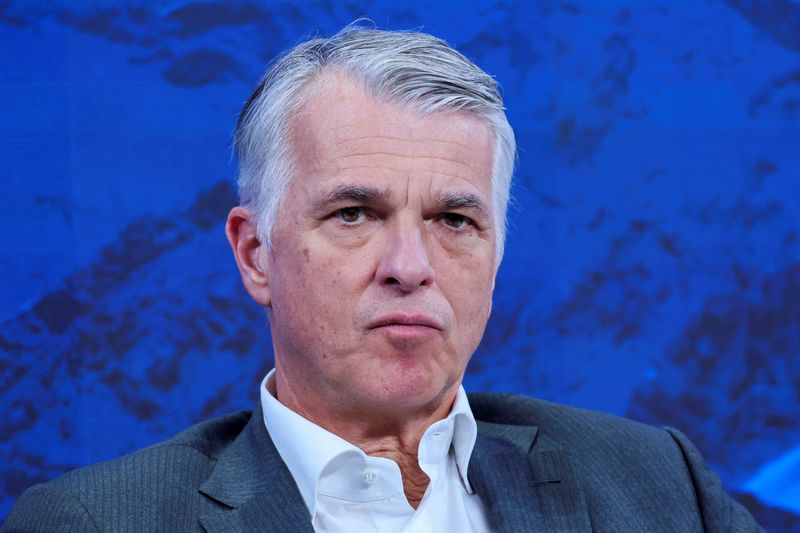By Noele Illien and Stefania Spezzati
ZURICH/LONDON (Reuters) - UBS CEO Sergio Ermotti said on Tuesday that authorities should not require it to hold more capital, ahead of an official review into the Swiss banking system over the failure of Credit Suisse.
Ermotti, speaking after full-year results from UBS, said that a lack of capital was not why Credit Suisse had collapsed and that "no expert is saying that more capital is necessary".
"The loss of trust and confidence, the lack of underlying profitability created a self-fulfilling problem" for Credit Suisse, Ermotti said during a call with analysts.
Last year's emergency takeover of Credit Suisse by UBS has forced a rethink on whether Switzerland's too-big-to-fail rules that emerged from the financial crisis are fit for purpose.
"If you look at regulation you know it was well applied and fully functioning for UBS, so the same regulation should have worked for Credit Suisse," the former investment banker added.
Some banking analysts are asking if regulators will push for higher capital requirements - a buffer banks must keep aside - as a way to make UBS safer, especially now that the bank has a balance sheet almost twice the size of the Swiss economy.
However, setting aside more capital could make UBS less competitive with large banking rivals in other jurisdictions and curb its ability to reward shareholders.
Globally systemically important banks such as UBS are required to create resolution plans, called living wills, which would allow regulators to unwind them without creating broader systemic issues. Regulators had considered resolution for Credit Suisse but did not pursue this path.
"Facts are telling us a crystal-clear story that capital is not the way to manage such a situation," Ermotti said.
Switzerland's finance ministry will submit its review of banking regulation to parliament this spring. The parliament will also report findings later this year from its investigative commission looking into Credit Suisse's downfall.
REGULATORY RISK
Ten months on from the Credit Suisse implosion, analysts and investors are focused on what changing regulations mean for UBS.
Two key investors fear it could be on a collision course with regulators because of its size, Reuters reported last week.
In a note to clients on Jan. 19 seen by Reuters, Autonomous analyst Stefan Stalmann downgraded his rating on UBS to neutral, highlighting the risk that too-big-to-fail rules could lead to further capital charges.
Capital requirements "are not just an obscure regulatory burden," said Stalmann, "but they do matter substantively for the creditors and counterparties".
Stalmann declined to comment when reached by Reuters.
Swiss financial regulator FINMA said in December that the capitalization of Credit Suisse's parent bank, which housed the Swiss operations, was its weak point.

In its report, FINMA said greater capitalization of the parent bank "increases the resilience of the entire group" and offers more protection from incidents at subsidiaries.
UBS on Tuesday reported a Common Equity Tier 1 ratio, a measure of its capital strength, of 14.5%, a level which is above current regulatory requirements.